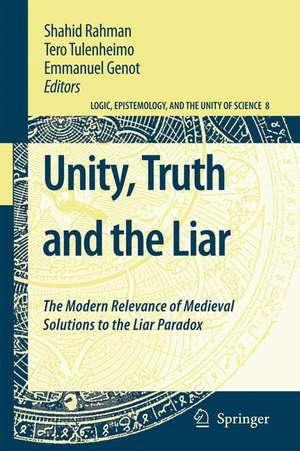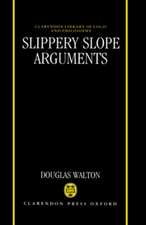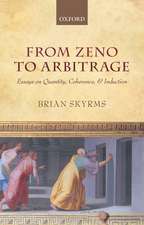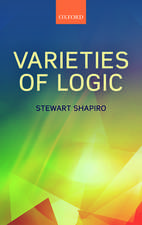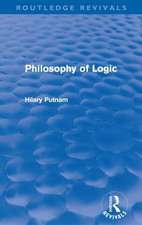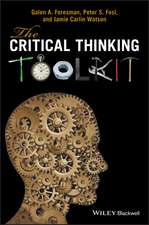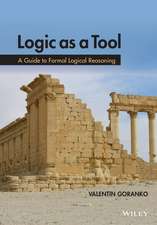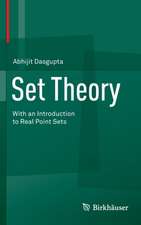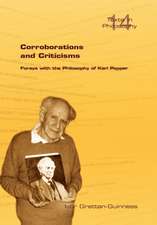Unity, Truth and the Liar: The Modern Relevance of Medieval Solutions to the Liar Paradox: Logic, Epistemology, and the Unity of Science, cartea 8
Editat de Shahid Rahman, Tero Tulenheimo, Emmanuel Genoten Limba Engleză Hardback – 28 oct 2008
| Toate formatele și edițiile | Preț | Express |
|---|---|---|
| Paperback (1) | 947.67 lei 6-8 săpt. | |
| SPRINGER NETHERLANDS – 25 noi 2010 | 947.67 lei 6-8 săpt. | |
| Hardback (1) | 953.82 lei 6-8 săpt. | |
| SPRINGER NETHERLANDS – 28 oct 2008 | 953.82 lei 6-8 săpt. |
Din seria Logic, Epistemology, and the Unity of Science
- 15%
 Preț: 645.60 lei
Preț: 645.60 lei - 18%
 Preț: 1233.06 lei
Preț: 1233.06 lei - 18%
 Preț: 995.94 lei
Preț: 995.94 lei - 18%
 Preț: 1712.87 lei
Preț: 1712.87 lei - 18%
 Preț: 945.62 lei
Preț: 945.62 lei - 18%
 Preț: 1235.25 lei
Preț: 1235.25 lei - 18%
 Preț: 1224.06 lei
Preț: 1224.06 lei - 18%
 Preț: 955.70 lei
Preț: 955.70 lei - 15%
 Preț: 644.95 lei
Preț: 644.95 lei - 24%
 Preț: 1058.23 lei
Preț: 1058.23 lei - 20%
 Preț: 558.63 lei
Preț: 558.63 lei - 24%
 Preț: 878.92 lei
Preț: 878.92 lei - 18%
 Preț: 1236.99 lei
Preț: 1236.99 lei - 24%
 Preț: 896.30 lei
Preț: 896.30 lei - 24%
 Preț: 791.27 lei
Preț: 791.27 lei - 24%
 Preț: 727.49 lei
Preț: 727.49 lei - 24%
 Preț: 789.90 lei
Preț: 789.90 lei - 20%
 Preț: 561.68 lei
Preț: 561.68 lei - 20%
 Preț: 560.31 lei
Preț: 560.31 lei - 20%
 Preț: 568.74 lei
Preț: 568.74 lei - 24%
 Preț: 1046.22 lei
Preț: 1046.22 lei - 24%
 Preț: 698.18 lei
Preț: 698.18 lei - 20%
 Preț: 549.89 lei
Preț: 549.89 lei - 18%
 Preț: 958.73 lei
Preț: 958.73 lei - 20%
 Preț: 580.53 lei
Preț: 580.53 lei - 20%
 Preț: 561.44 lei
Preț: 561.44 lei
Preț: 953.82 lei
Preț vechi: 1163.20 lei
-18% Nou
Puncte Express: 1431
Preț estimativ în valută:
182.50€ • 190.57$ • 150.71£
182.50€ • 190.57$ • 150.71£
Carte tipărită la comandă
Livrare economică 15-29 aprilie
Preluare comenzi: 021 569.72.76
Specificații
ISBN-13: 9781402084676
ISBN-10: 1402084676
Pagini: 364
Ilustrații: XXIV, 338 p.
Dimensiuni: 155 x 235 x 27 mm
Greutate: 0.69 kg
Ediția:2008
Editura: SPRINGER NETHERLANDS
Colecția Springer
Seria Logic, Epistemology, and the Unity of Science
Locul publicării:Dordrecht, Netherlands
ISBN-10: 1402084676
Pagini: 364
Ilustrații: XXIV, 338 p.
Dimensiuni: 155 x 235 x 27 mm
Greutate: 0.69 kg
Ediția:2008
Editura: SPRINGER NETHERLANDS
Colecția Springer
Seria Logic, Epistemology, and the Unity of Science
Locul publicării:Dordrecht, Netherlands
Public țintă
ResearchCuprins
Disputatio.- The Truth Schema and the Liar.- Read and Indirect Revenge.- Tarski's Hidden Theory of Meaning: Sentences Say Exactly One Thing.- Doubting Thomas: From Bradwardine Back to Anon.- Logic Without Truth.- Scheming and Lying.- Comments on Stephen Read's “The Truth-Schema and the Liar”.- Models for Liars in Bradwardine's Theory of Truth.- On a New Account of the Liar.- The Liar Cannot Be Solved.- Out of the Liar Tangle.- Read about T-Scheme.- Further Thoughts on Tarski's T-scheme and the Liar.- Historical Background: Restrictionism versus the Manifold Theory of Meaning.- Restrictionism: A Medieval Approach Revisited.- William Heytesbury and the Treatment of Insolubilia in Fourteenth-Century England Followed by a Critical Edition of Three Anonymous Treatises De Insolubilibus Inspired by Heytesbury.
Textul de pe ultima copertă
The Liar Paradox challenges logicians’ and semanticists’ theories of truth and meaning. Modern accounts of paradoxes in formal semantics offer solutions through the hierarchy of object language and metalanguage. Yet this solution to the Liar presupposes that sentences have unique meaning. This assumption is non-controversial in formal languages, but an account of how “hidden meaning” is made explicit is necessary to any complete analysis of natural language. Since the Liar Paradox presents itself as a sentence uniting contradictory meanings, appreciating how they can be united in a single sentence may provide new insights into this and other paradoxes.
This volume includes a target paper, taking up the challenge to revive, within a modern (formal) framework, a medieval solution to the Liar Paradox which did not assume Uniqueness of Meaning. Stephen Read, author of the target paper, attempts to formally state a theory of truth that dates back to the 14th century logician Thomas Bradwardine; the theory offers a solution to the Liar Paradox in which the Liar sentence turns out to be false. The rest of the volume consists of papers discussing and/or challenging Read’s – and Bradwardine’s -- views one the one hand, and papers addressing the doctrinal and historical background of medieval theories of truth on the other hand. It also includes a critical edition of Heytesbury’s treatise on insolubles, closely related to Bradwardine’s view.
Including formal, philosophical and historical discussions, this volume intends to renew the debate about paradoxes and theory of truth, and to show that the interest of earlier medieval work is not merely historical but, on the contrary, still relevant for modern, formal semantic theory. It is of interest for both professional philosophers and advanced students of philosophy.
This volume includes a target paper, taking up the challenge to revive, within a modern (formal) framework, a medieval solution to the Liar Paradox which did not assume Uniqueness of Meaning. Stephen Read, author of the target paper, attempts to formally state a theory of truth that dates back to the 14th century logician Thomas Bradwardine; the theory offers a solution to the Liar Paradox in which the Liar sentence turns out to be false. The rest of the volume consists of papers discussing and/or challenging Read’s – and Bradwardine’s -- views one the one hand, and papers addressing the doctrinal and historical background of medieval theories of truth on the other hand. It also includes a critical edition of Heytesbury’s treatise on insolubles, closely related to Bradwardine’s view.
Including formal, philosophical and historical discussions, this volume intends to renew the debate about paradoxes and theory of truth, and to show that the interest of earlier medieval work is not merely historical but, on the contrary, still relevant for modern, formal semantic theory. It is of interest for both professional philosophers and advanced students of philosophy.
Caracteristici
Provides a formal reconstruction of several medieval theories of truth, demonstrating their relevance to modern research Approaches the discussion about truth theory and paradoxes from a semantical, logical and a historical perspective Contains critical editions of the medieval sources of the insolubilia, such as Heytesbury’s treatise on Insolubles (14th century), with introduction and notes Revives the debate on the Liar Paradox Entirely written in dispute style
